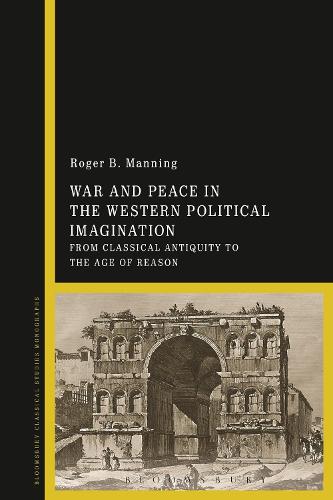
War and Peace in the Western Political Imagination: From Classical Antiquity to the Age of Reason
(Paperback)
Available Formats
Publishing Details
War and Peace in the Western Political Imagination: From Classical Antiquity to the Age of Reason
By (Author) Dr Roger Manning
Bloomsbury Publishing PLC
Bloomsbury Academic
21st September 2017
United Kingdom
Classifications
Tertiary Education
Non Fiction
History of ideas
303.6609
Physical Properties
Paperback
392
Width 154mm, Height 232mm, Spine 24mm
600g
Description
This book is open access and available on www.bloomsburycollections.com. It is funded by Knowledge Unlatched. The study of war in all periods of prehistory and recorded history has always commanded the attention of historians, dramatists, poets and artists. The study of peace has, however, not yet gained a comparable readership, and the subject is attracting an increasing amount of scholarly research. This volume presents the first work of academic research to tackle this imbalance head on. It looks at war and peace through the ages, from the Classical world through to the 18th century. It considers the nature and advocacy of war and peace both from an historical perspective but also a philosophical one, particularly looking at how universal peace, which began as a personal philosophy, became over the centuries a political philosophy that underpins much of modern societys attitudes towards warfare and militarism. Roger Manning begins his journey through history by looking at the Greek martial ethos and philosophical concepts of peace and war in the ancient world; moving through the Roman empires military advances, he explores the concepts of war and peace in the medieval world and the Renaissance, with the writing of Machiavelli and Erasmus; finally, his account of the search for a science of peace in the 17th and 18th centuries brings the book to its conclusion.
Reviews
[A] succinct, well informed discussion of the martial ethos of ruling elites in the Western world since Greek antiquity War and Peace in the Western Political Imagination will appeal to political theorists, philosophers, and theologians. * Michigan War Studies Review *
This is a valuable work of political thought, a subject that tends to place insufficient weight on such issues. Mannings sound knowledge of texts and his skillful use of them deserve considerable praise. * Journal of World History *
[An] important achievement in its ambition to trace peace thinking through the ages Mannings book is full of interesting observations and learned reflections. It is a pleasure to read [This] is a timely volume which should find its place in any syllabus on peace, or on war, for that matter. * The Review of Politics *
In this smart and tightly argued book Professor Manning offers a compelling explanation for why war and a martial ethos became so entrenched in the western imagination since antiquity, and why a peace alternative had such difficulty taking hold, at least until the seventeenth and eighteenth centuries. Anyone interested in learning about the history of war and peace ideas will find this well-researched and richly contextualized work indispensable. * Ben Lowe, Professor of History, Florida Atlantic University, USA and author of Imagining Peace: A History of Early English Pacifist Ideas, 1340-1560 *
An important work on a crucial aspect of political thought. Manning ranges widely to offer a coherent, interesting and engaged account. Deserves much attention. * Jeremy Black, Professor of History, University of Exeter, UK *
The intelligent observer of current world tensions can neither avoid hearing nebulous phrases such as holy war and just war, nor fully understand a discussion of limited war given the unquestioned acceptance of a temporally unbound war on terror. This book, whose appearance may be adventitious, is nevertheless indispensable by providing a cogent historical context for understanding how Western thinkersfrom the ancient through the early modern periodsconceptualized war and peace. Manning (emer., history, Cleveland State Univ.) accomplishes this in what is (mostly) a chronological narrative of the conflicts themselves, as well as a discussion of how Western intellectuals thought about violence (intrastate and interstate). The author discusses every major political thinker, from Hesiod through Kant, with a view toward understanding the development of each thinker's ideas through his interaction with contemporaneous conflicts, other intellectuals, and an understanding of past wars. As an example of the latter, Manning argues that Hobbes developed his analysis of how and why societies go to war from translating Thucydidess Peloponnesian War. The authors reliance on both primary and secondary sources, coupled with a scholarly and balanced perspective, goes a long way towards contextualizing current political rhetoric. Summing Up: Highly recommended. Upper-division undergraduates and above. * CHOICE *
Author Bio
Roger B. Manning is Emeritus Professor of History, Cleveland State University, USA. He has published widely on British and military history, including An Apprenticeship in Arms (2006) and Swordsmen: The Martial Ethos in the Three Kingdoms (2003).
